- Home
- Augusten Burroughs
Running With Scissors Page 2
Running With Scissors Read online
Page 2
She led me into her study, took a seat at her desk and turned off her white Olympia typewriter. Then she quickly checked the cap on her bottle of Wite-Out before clearing her throat and lighting a More cigarette. I sat on the twin bed she had converted into a sofa with throw pillows and an Indian bedspread.
“Ready?” she asked
“Okay.”
She crossed her legs, resting the side of her wrist on her knee as she leaned forward and read from the page. “Childhood is over. My youth. And bonds with people I have loved are broken now. My grief ascends into the clouds. And those tears that fall from the sky build the land anew, even the dead climb from their graves to walk with me and sing. And I . . .”
She read for many pages, her voice perfectly modulated. She practiced reading her poems out loud into a microphone that she kept in the corner of the room on a stand. Sometimes, when she was visiting her friend Lydia or in the living room trimming her spider plants, I would borrow the microphone and stuff it down the front of my pants, examining myself from every angle in the mirror.
When she was finished reading her poem, she looked up at me and said, “Okay, now I need your honest reaction. Did it feel powerful to you? Emotionally charged?”
I knew that the only correct answer to this question was, “Wow. That really does seem like something you’d read in The New Yorker.”
She laughed, pleased. “Really? Do you really think so? The New Yorker is very selective. They don’t publish just anyone.” She stood and began to pace in front of her desk.
“No, I really think they would publish this. All the stuff about your mother pushing you backwards into the heartshaped goldfish pond in the backyard, the thing with your paralyzed sister, that was great.”
She lit another cigarette and inhaled deeply. “Well, we’ll see. I just got a rejection letter from The Virginia Quarterly. So that worries me. Of course, if The New Yorker did accept this poem, your grandmother would see it. I can’t imagine what she would say. But I can’t let her reaction stop me from publishing.” Then she stopped pacing, placed one hand on her hip and brought the other one holding the cigarette to her lips. “You know, Augusten. Your mother was meant to be a very famous woman.”
“I know,” I said. The idea that someday we might have our own stretch limousine parked in the driveway instead of that awful brown Dodge Aspen station wagon was so thrilling that I almost couldn’t stop myself from screaming. “You will be famous,” I told her. “I just know it.” I also knew I wanted tinted windows and a mini-bar in the back.
My father was otherwise occupied in his role of highly functional alcoholic professor of mathematics at the University of Massachusetts. He had psoriasis that covered his entire body and gave him the appearance of a dried mackerel that could stand upright and wear tweed. And he had the loving, affectionate and outgoing personality of petrified wood.
“Can we play checkers,” I whined, while he sat at the kitchen table grading papers and drinking vodka from a tumbler.
“No, son. I’ve got too much work to do.”
“Later can we play checkers?”
My father continued to scan the page with his red pen, making a note in the margin. “No, son. I told you, I’ve got a lot of work to do and later I’ll be tired. You go out and play with the dog.”
“But I’m sick of the dog. All she wants to do is sleep. Can’t you play one game?”
Finally he looked at me. “No, son, I can’t. I’ve got a lot of work to do, I’m tired, and my knee is acting up.”
My father had a bad knee. Arthritis caused it to swell, so he would have to go to his doctor and have it drained with a needle. He limped and wore a constant pained expression on his face. “I wish I could just sit in a wheelchair,” he used to say. “It would be so much easier to get around.”
The one activity my father and I did do together was take the garbage to the dump. “Augusten,” he called from downstairs in the basement. “If you load the car up, I’ll take you for a ride to the dump.”
I slipped on a mood ring and ran downstairs to the basement. He was wearing a red-and-black checkered field coat, hoisting two green plastic bags over his shoulders as he winced in pain. “Make sure the top is closed,” he warned. “You don’t want that bag breaking open and spilling garbage all over the floor. That would just be a nightmare to clean up.”
I dragged one of the bags across the floor toward the door.
“Jesus, son. Now, don’t drag that bag. You’ll tear the bottom and we’ll have garbage all over the place. I just warned you about that.”
“You said check the tops,” I said.
“Yes, but it should go without saying that you can’t drag a garbage bag across the floor.”
He was wrong. I’d seen the commercials for Hefty garbage bags on TV “They won’t break,” I corrected him, dragging.
“Now, Augusten. You’ve got to carry that bag. If you can’t behave and carry that bag, I won’t let you come to the dump.”
I sighed deeply and carried the bag outside to the Aspen, then returned to the basement for another. We tended to let garbage collect for weeks, so there were always at least twenty bags.
When the car was filled, I squeezed into the front seat between my father and one of the trash bags. The sour smell of old milk cartons, egg shells and emptied ashtrays filled me with pleasure. My father, too, enjoyed the aroma. “I rather like that smell,” he commented as we made the six-mile trip to the public dump. “I wouldn’t mind living next to a landfill one bit.”
At the dump, my father and I opened the rear hatch of the station wagon and all of the doors. Perched on the ledge overlooking the pit where we threw the bags, the car looked poised for flight. Its doors were like wings and the grille in front seemed to be smiling. Here, I was free to pull out a bag, drag it across the ground and then hurl it out.
Afterward, we drove past the gray cinder block recycling building where people left the remains of their broken baby strollers, rusty stoves and unwanted dollhouses.
“Please, can I take it home?” I whined upon seeing a chrome coffee table with a chipped, smoked-glass top.
“No, we’re not taking any of that stuff home. You don’t know where any of this garbage has been.”
“But it’s still good.” I knew I could hide the chip by fanning a display of magazines on the surface, like in a doctor’s office. And it certainly wouldn’t be dirty after I polished it with Windex for three hours.
“No, son. Now stop touching that filthy thing and get back in the car. And don’t touch your face now that you’ve got those coffee table germs all over your fingers.”
My mood ring went black. “Why can’t I have it? Why?”
My father sighed, exasperated. “I told you,” he said through clenched teeth, “we don’t know who that dirty thing belonged to. We just finished taking trash out of the house. We don’t need to be bringing more trash in.”
I sat pressed against the unlocked door, miserable. It was my secret hope that the door would fly open on the highway and I would tumble from the car, rolling onto the highway where I would be crushed beneath the tires of the Barstow onion truck behind us. Then my father would be sorry he wouldn’t let me have the coffee table.
Unfortunately, my parents loathed each other and the life they had built together. Because I was the product of their genetic fusion, well, it’s not surprising I liked to boil my change on the stove and then shine it with metal polish.
“You infantile tyrant,” my mother shouted from her position on the sofa, legs folded up beneath her. “You goddamn bastard. You’d like nothing more than to see me slit my wrists.” She absently twisted the tassel on her long crocheted vest.
This was Cream’s cue and she tucked her tail between her legs and slipped from the room, heading downstairs to sleep next to the boiler.
My father’s face grew red as he added a splash of tonic water to his glass. “Deirdre, will you just settle down. You’re hysterical, just hysterical.�
�� Because he was a professor, he was in the habit of repeating himself.
She stood up from the sofa and walked slowly across the white shag carpeting, as if finding her mark on a soundstage. “I’m hysterical?” she asked in a smooth, low voice. “You think this is hysterical?” She laughed theatrically, throwing her head back. “Oh, you poor bastard. You lousy excuse for a man.” She stood next to him, leaning her back against the teak bookcase. “You’re so repressed you mistake creative passion for hysterics. And don’t you see? This is how you’re killing me.” She closed her eyes and made her Edith Piaf face.
My father moved away from her. He brought the glass to his lips and took a deep swallow from his drink. Because he’d been drinking all evening, his words were slightly blurry. “Nobody’s trying to kill you, Deirdre. You’re killing yourself.”
“I wish you’d rot in hell,” she spat. “I regret the day I ever married you.”
While they were fighting, I was sitting at the dining-room table fastening and unfastening the lobster claw clasp on the gold chain my mother had bought me in Amherst. I worried constantly that it would fall from my neck. And the only thing that reassured me was to test its dependability over and over again. I glanced up and said, “Can’t you two stop fighting? You always fight and I hate it.”
“This is between me and your father,” my mother said coldly.
“No it’s not,” I shouted with surprising volume. “It’s not just between you because I’m here too. And I can’t stand it. All you ever do is scream at each other. Can’t you just leave each other alone? Can’t you try?”
My mother replied, “Your father is the one who is making things difficult for us.”
Eventually, the fight moved next door to the kitchen, providing them with better lighting as well as potential weapons.
“Look at your damn face,” my mother said. “You’ve got the face of a man twice your age. Thirty-seven years old going on eighty.”
My father was very drunk by now and the only way he could imagine restoring silence to the house was to stop my mother from breathing.
“Get your damn hands off of me,” my mother screamed, struggling against my father’s hands, which had found their way around her neck.
“Shut the hell up, you bitch.” His teeth were clenched.
I had followed them into the kitchen, and was standing in the doorway in my Snoopy pajamas. “Stop!” I screamed. “Stop this!”
In one motion, my mother shoved my drunk father, sending him reeling backward against the kitchen counter. His head hit the dishwasher on the way down and when he made contact with the kitchen floor, he didn’t move. A small pool of blood began to form under his ear and I was sure he was dead.
“He’s not moving,” I said, moving closer.
“This spineless bastard is only playing another one of his pitiful games.” She nudged his bad knee with her red toe. “Get up, Norman. You’re frightening Augusten. Enough of your pranks.”
My father eventually sat up, leaning his head back against the dishwasher.
With disgust, my mother tore a Bounty paper towel from the roll and handed it to him. “I should just let you bleed to death for terrifying our son like that.”
He pressed it against the side of his face to absorb the blood.
Seeing that my father was still alive, I was now worried about my mother. “Please don’t hurt her,” I said. “Please don’t kill her.” The problem was, my father’s unemotional nature scared me. There was a difference between the calm expression of the man on a jar of Taster’s Choice coffee and the blank expression my father wore. I was afraid he was, like my mother said, Bottled with rage, ready to snap.
Again, I leaned forward. “Please don’t kill her.”
“Your father isn’t going to kill me,” my mother said, switching on the front burner of the stove, pulling a More from her pack, and leaning over to light it on the heating coil. “He’d rather suffocate me with his horribly oppressive manipulation and then wait for me to cut my own throat.”
“Will you please just shut the hell up, Deirdre?” my father said, weary and drunk.
My mother smiled down at him, blowing smoke through her nostrils. “I will please shut the hell up the day you please drop the hell dead.”
I was seized with panic. “Are you going to cut your own throat?” I asked her.
She smiled and held out her arms. “No, of course not. That’s just a figure of speech.” She kissed the top of my head and scratched my back. “Now, it’s nearly one in the morning; way past your bedtime. You need to go to sleep so you can be ready for school in the morning.”
I walked off to my room, where I selected an outfit for school and carefully arranged it on hangers at the front of the closet. I would wear my favorite polyester tan pants and a blue shirt with the vest cleverly sewn on. If only I had a pair of platform shoes the outfit would be complete.
Still, knowing my clothes were ready gave me a sense of calm. I could control the sharpness of the crease in my doubleknit slacks, even if I couldn’t stop my mother from hurling the Christmas tree off the porch like she did one winter. I could polish my 14k gold-plated signet ring with a Q-tip until the gold plating wore off even if I couldn’t stop my parents from throwing John Updike novels at each other’s heads.
So I became consumed with making sure my jewelry was just as reflective as Donnie Osmond’s and my hair was perfectly smooth, like plastic.
Besides clothing and jewelry, there were two other things I valued in life: medical doctors and celebrities. I valued them for their white jackets and stretch limousines. I knew for sure that I wanted to be either a doctor or a celebrity when I grew up. The ideal would have been to play a doctor on a TV show.
And this is where the fact that we lived in the woods surrounded by pine trees came in handy. Because in desperation, pine trees can become Panavision cameras. Their broken branches, boom mics. This allowed me to walk through the woods or down the dirt road we lived on, imagining that there was always a camera trained on my every move, zooming in close to capture my facial expression.
When I looked up at a bird in the sky, I wondered how the light was falling on my face and if that branch was catching it just right.
Mine was a delusional world filled with tall trees that held long lenses and followed me on dollies. A fallen branch in the woods was not a fallen branch; it was “my mark.”
When I wasn’t “on the set” throwing branches around with my bionic arm or doing a toothpaste commercial in front of a boulder, I was trying to trick my mother into taking me to the doctor.
By the time I was ten, I was having weekly allergy shots—eleven in each arm. I had persistent warts on my fingers that needed to be burned off and my throat was constantly sore due to the dust that I cupped into my hands and inhaled.
A visit to the doctor meant exposure to those crisp, clean white jackets and the glint of a silver stethoscope around the neck. I was also aware that doctors got to park where they wanted and speed without getting tickets, both of which seemed the height of privilege when President Carter had made us all drive forty miles an hour and live in the dark.
I had two doctors that I saw regularly. Dr. Lotier, who had long hairs sprouting from his nose and the backs of his hands, and a dignified Indian allergist named Dr. Nupal. Dr. Nupal drove a white Mercedes (I asked him) and smelled like freshly washed hands with subtle undertones of Aqua Velva.
Just thinking of my doctors filled me with soothing images of overhead fluorescent lighting, shiny new needles and shoes so polished they inspired in me a sense of awe unequalled by anything except the dazzling sets of the Academy Award shows.
And then there was Dr. Finch.
As the mood in my home changed from one of mere hatred to one of potential double homicide, my parents sought help from a psychiatrist. Dr. Finch looked exactly like Santa Claus. He had a shock of thick white hair, a full white beard and eyebrows that resembled toothbrush bristles. Instead of wearing a red suit
trimmed with white fur, he wore brown polyester slacks and a short-sleeved button-down white shirt. He did, however, sometimes wear a Santa hat.
The first time I ever saw him he appeared at our house in the middle of the night, following an especially bad fight between my parents. As my mother hyperventilated on the sofa, smoking cigarette after cigarette, the doorbell rang. “Oh, thank God,” she said, quickly getting up from the couch to answer the door.
He was carrying a balloon and there was a button on his jacket lapel that read, “World Father’s Organization.” He peered over my mother’s shoulder and looked directly at me. “Hello there.”
I moved back, unsure.
“Please, come in,” my mother said, motioning him inside. “I’ve just been a frantic wreck waiting for you to get here.”
The doctor said, “It’s okay now, Deirdre.” Then he reached in his pocket and handed me a button, identical to the one on his lapel. “Would you like one of these? As a gift?”
“Thanks,” I said, taking the button and inspecting it.
Then he reached in his pocket again and withdrew a handful of balloons. “And these,” he said.
“Okay,” I said again. The colorful balloons seemed out of context, given my mother’s mood, but I liked them anyway. I could blow them up, tie them into a bunch and then attach them to Cream’s collar or tail.
The doctor turned to my mother. “Where’s Norman?”
She bit the nail of her thumb, her brow creased with worry. She’d gnawed off all the polish and the nail itself was chewed down to the quick. “He’s downstairs. Drunk.”
“I see,” he said, removing his heavy black coat and draping it over the chair in the front hall.
“I was afraid for my life tonight,” she said. “I thought for sure he was going to kill me. That this would finally be the night.”
Earlier in the evening, my parents had been screaming at each other. The screaming escalated until my father was chasing my mother through the house with a Danish fondue pot held high above his head.

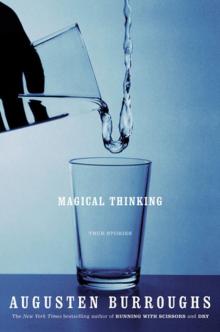 Magical Thinking: True Stories
Magical Thinking: True Stories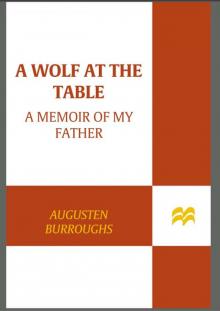 A Wolf at the Table
A Wolf at the Table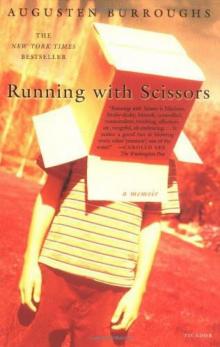 Running With Scissors
Running With Scissors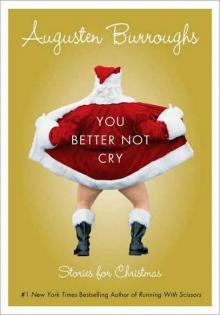 You Better Not Cry: Stories for Christmas
You Better Not Cry: Stories for Christmas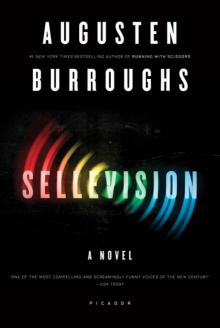 Sellevision
Sellevision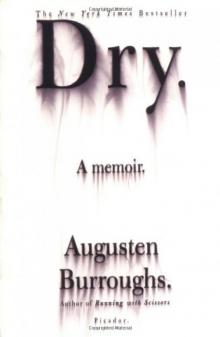 Dry
Dry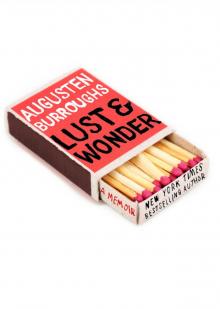 Lust & Wonder
Lust & Wonder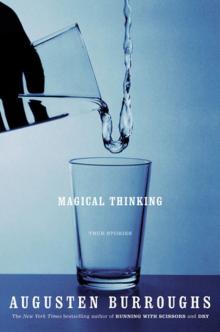 Magical Thinking
Magical Thinking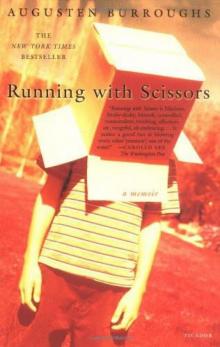 Running With Scissors: A Memoir
Running With Scissors: A Memoir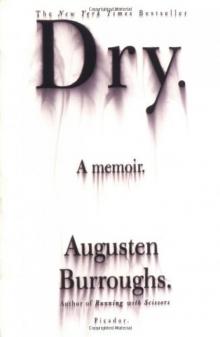 Dry: A Memoir
Dry: A Memoir